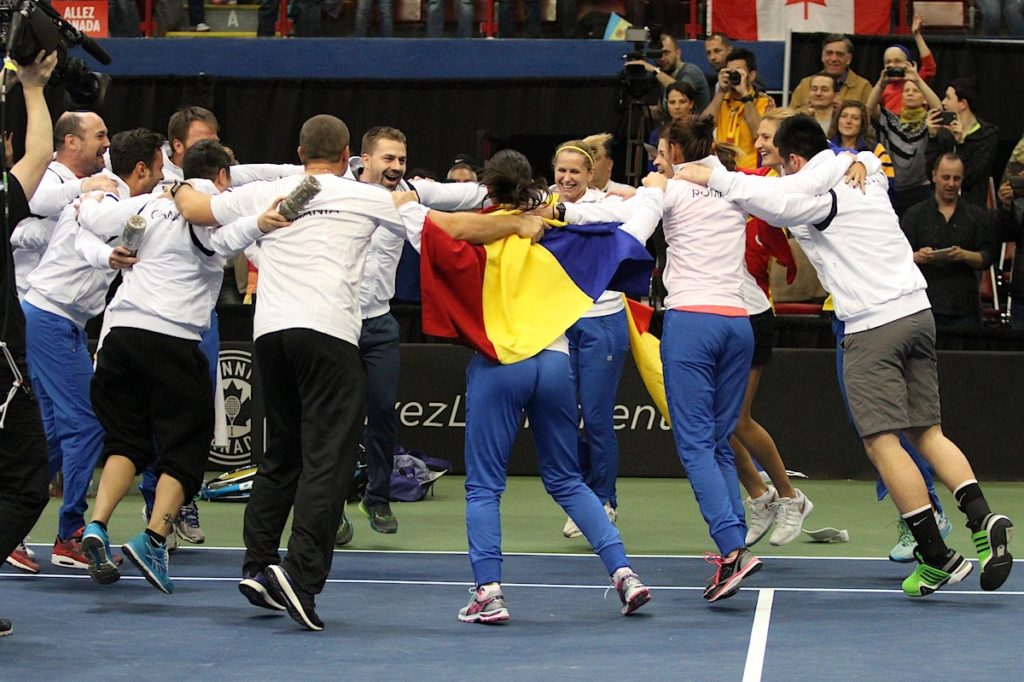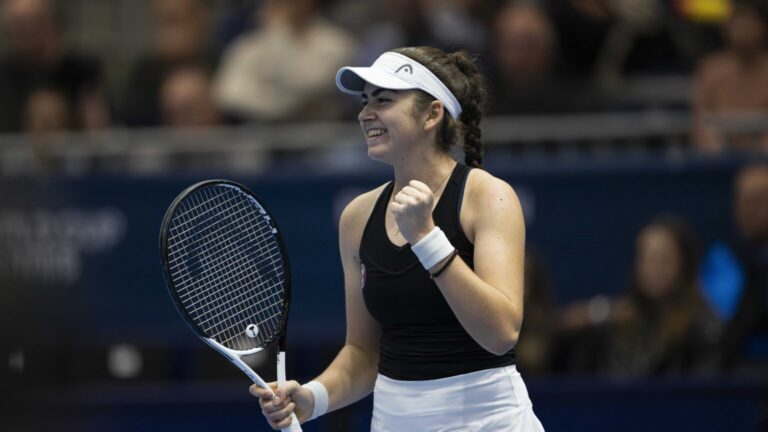
Genie Bouchard was unable to snap out of her recent doldrums – losing both her Fed Cup matches this weekend against Romania at the Maurice Richard Arena in Montreal – and as a result Canada has lost its spot in the eight-nation World Group I and will be relegated to eight-country World Group II.
That means that in 2016 Canada will not be competing for the Fed Cup but for a return to the top echelon in 2017.
Entering Sunday with the countries tied at 1-all, after Bouchard lost to Alexandra Dulgheru and Francoise Abanda defeated Irina-Camelia Begu on Saturday, Bouchard looked to break out of a four-match losing streak and seemed to have an easier opponent because Begu withdrew with a calf issue.

Her replacement, 23-year-old Andreea Mitu (above), ranked No. 104, had won two rounds at last week’s WTA clay-court event in Charleston but really had done little to suggest she could threaten a player of Bouchard’s calibre.
The crowd in Maurice Richard Arena gave Bouchard a huge ovation when she walked on court at 1 p.m. and it appeared a perfect situation for her to get her tennis back on track.
She won the opening game easily and was clearly trying to temper her usually hyper-aggressive shotmaking – staying in rallies long enough to allow Mitu to make unforced errors.
Things were unfolding favourably for her, as well as Canada’s hopes, when she broke serve to lead 4-2. But then an all-too-familiar pattern reemerged. She started the next game on her serve with a forehand error, double-faulted to fall behind 15-40. She managed to recover to hold the advantage but then shanked a forehand long. Two points later it was a backhand unforced error into the net and Mitu was back in business.
Until Mitu got on a run when a disheartened Bouchard faded in the third set, the kindest adjective to describe the level of play of both players during the match was “uneven.” Poor was also a bit of a euphemism.

Both players blew hot and cold but Bouchard held together a little better to take the opening set 6-4. She led 4-3 in the second set but again fell into passages of very un-Bouchard-like play. As well as Mitu played – and her forehand was formidable at times and her serve picked up semi-miraculously in the final set – any observer watching would be forgiven for thinking that a year ago Bouchard might have struggled a bit early but would probably have rolled comfortably to a one-sided win over the Romanian by a score such as 6-3, 6-1.
But it isn’t a year ago and Bouchard has sketchy confidence at best. Mitu broke Bouchard at 4-all in the second set – helped by a double fault at 15-30 – and then held to take the set.
The final set was painful to watch for Canadian backers – Bouchard was basically out of it after losing her serve in the opening game.
“It was close in the second set at 4-all and I had my chances,” she would say later. “At times, I tried to be aggressive but also to keep the ball in play. Maybe at that time I wasn’t aggressive enough and she was dominating the points. She was the one that raised her level and controlled the points too much.”

Following the Bouchard loss, Canada’s chances looked bleak with Abanda coming out to take on Dulgheru, the Romanian heroine of Saturday’s action with her upset of Bouchard.
But the 18-year-old Montrealer played strong, solid tennis on serve and from the backcourt and led 6-4, 4-2 against the 25-year-old Romanian, who said she had a lot of trouble finding her rhythm after playing the heavier hitting Bouchard a day earlier.
“Just move your feet and put more energy into the game,” that was the advice that Dulgheru would later reveal she got from her captain Alina Cercel-Tecsor.

Dulgheru won three games in a row to lead 5-4 and the match was poised to go either way. Abanda, who had played for two hours and 40 minutes in overcoming Begu 24 hours earlier, hung in the rallies but eventually Dulgheru, back on her game, was the slightly better player and took the set 7-5 on her second set point.
After bathroom breaks at the end of the set, Abanda broke serve to love in the opening game of the third set and led 40-15 in the second game. But Dulgheru rallied and won the second game to end Abanda’s momentum. Both players held serve to 2-all but after that Dulgheru gradually pulled away.
“It was a weird match,” she said, “for a set and a half I didn’t feel the ball. But even when she led 4-2 in the second set, I was already feeling I was (back) in the game.”
Dulgheru, ranked No. 69, noted about Abanda, “if she keeps going she has good potential. She’s tall, she has a good serve and she moves easily – takes one step and she’s already there.”

“I was definitely the underdog,” Abanda said about the match-up with Begu. “I’m the lowest ranked (No. 260) out of the eight girls here and the youngest. I gave everything had. I gave my full effort. And if every girl gives their 100 per cent then there’s nothing more we could have done.”
About any possible fatigue factor after beating No. 33-ranked Begu on Saturday in a long match, Abanda said, “I played one tough match yesterday and I had another big challenge today. I can’t say that I was top shape in the third set. It was definitely a bit hard physically and mentally but I give credit to my opponent because she really stayed in there. She won so I guess it wasn’t enough. I guess I’ll have to keep improving overall.”

Captain Sylvain Bruneau, commenting on Abanda’s performances over the weekend, said, “I’m really pleased because it’s been a while that all the women’s tennis development team at Tennis Canada have believed in her. We think she’s a player with a remarkable potential. She’s only 18 but we’ve felt for a while that she’s close to doing something special. Her results have been a little up and down. But this weekend, for her to beat a player ranked No. 33 like Begu, who’s had a super 2015 year, and for her to stay with, and be close to winning, against Dulgheru who was playing inspired tennis, I’m very pleased with her. I hope it will give her the confidence, the motivation and the feeling to put everything into it and have more good results.
It was interesting to note earlier in the weekend that, when Abanda stood beside the 5-foot-10 Bouchard, she seemed to be a tiny bit taller.
Their evolution together is interesting. Both were semi-finalists in the 2012 Wimbledon Junior Girls event when Abanda was 15 and Bouchard was 18. Abanda has struggled with a shoulder issue in the meantime that has held her back for significant stretches of time. But she now seems healthy and ready to fulfill what was once seen as a potential similar to Bouchard.
As for Bouchard, she was candid and composed talking about her struggles, which hopefully have reached rock bottom with two crushing defeats in her hometown on Saturday and Sunday.
“I’m going through a little bit of a difficult period, whether I like it or not,” she admitted. “I haven’t been feeling myself for a while.”
She quickly dismissed any suggestion that she has a health issue, insisting, “I’m not sick. I feel fine.”
As for her inept performances of late, she could only offer, “I don’t have an explanation. I can’t win every match. I’ve lost five in a row. (But) I think there are more serious things in life.”
She has pulled out of this week’s WTA event in Stuttgart and intends to return to action in Madrid in two weeks. “It’s going to be a long road to get back,” she said. “It will take some time. I’ll be patient. I’ll lose some matches but it’s part of the process.”
Bruneau was asked about Bouchard’s current state of affairs. “She’s got problems, that’s obvious,” he said. “It can happen to any athlete to have a down phase. She’s lacking some confidence and it shows in her game. She’ll rebuild her confidence slowly and we’ll see the Eugenie Bouchard of the good days, I’m sure of that.”
Asked what counsel he gave her during the change-overs in the Mitu match, he said, “I sense that she’s very tense. There’s a weight on her shoulders and it shows in her game, in her movement. I try to distance her a bit from the outcome of the match…try to get her to liberate herself, to play the tennis she likes playing and enjoy herself. But it’s not easy in conditions like these and with everything around them. And I should note that I think she was very courageous to come and play knowing she wasn’t at her best. And with a preparation that was only a few days on hard courts and then to go back again onto clay. There are quite a few players who would have said ‘I’ve not playing, I’m not coming. I’m working on my own things.’ But she came and I think that’s commendable.”

Bouchard seems as eager as ever to get to work, but there have to be some concerns about how pale and thin she looked in Montreal. She could probably add 10 pounds and possibly be a stronger, fitter competitor.
She has an experienced support group around her, as well as Jordan Caron, a 24-year-old NHL hockey player with the Colorado Avalanche, who was at Sunday’s match and appears to be her boyfriend.
Bouchard seems all too aware of the publicity swirling around her current struggles on the court, saying in a slightly testy manner on Sunday, “maybe I’m having the sophomore slump that you (media) guys all talk about…so we’ll leave it at that.”
When told by a reporter that many of her online fans are “freaking” about her current tennis problems, she responded, “I don’t talk to those people so I have nothing to say to those people except that I’m trying my best and I believe in myself.”
Maybe one of the best signs about Bouchard going forward was that 20 minutes after Sunday’s final doubles match – won in a match tiebreak by Canadians Sharon Fichman and Gabriela Dabrowski over Mitu and Raluca Olaru – Bouchard was still in the arena posing for pictures with ballkids as well as having relaxed chats with various people including her coach Sam Sumyk.
Romanians were very present

There was a surprisingly large Romanian presence at the Maurice Richard Arena for both days of play in the World Group I Playoff.
Montreal has a sizeable Romanian community and much of the reason for that is that French has been traditionally taught as a second language in Romania. Apparently that’s not quite as much the situation these days, with English gradually gaining the ascendance.
At times on Sunday, it was difficult to tell if the 2,200 spectator crowd was more pro-Canada or pro-Romania. All and all it was well-behaved as were the Romanian players. Tennis Canada officials reported that they were very pleasant and easy to deal with all week – during and during the matches.
So the Romanians now move up to World Group I for 2016 while Canada falls back to World Group II. But the company there isn’t too shabby – the United States and Serbia will also be in World Group II next year.


